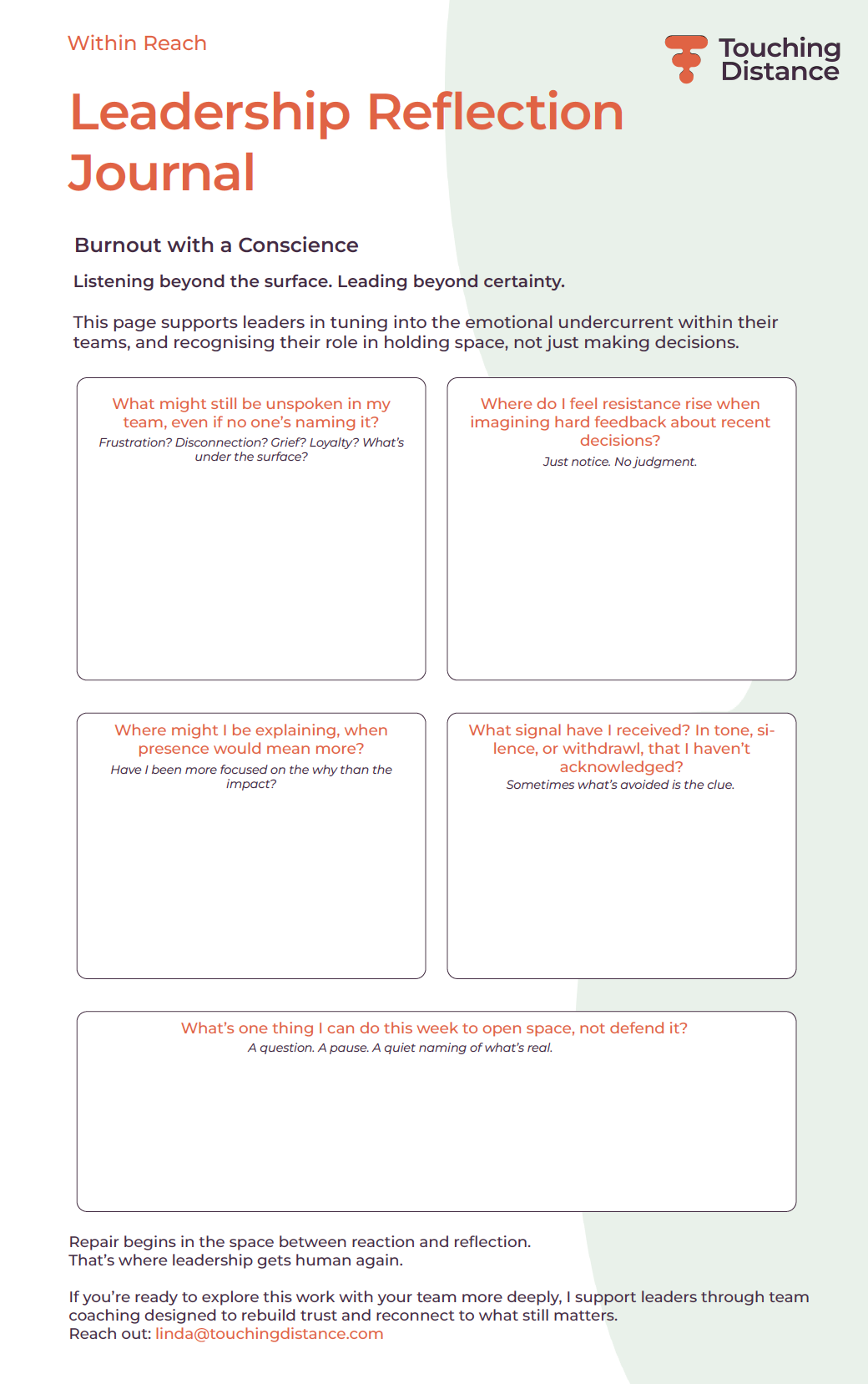Burnout with a Conscience
This isn't burnout from doing too much.
It's burnout from staying true to your values in a system that no longer reflects them.
Lately, in coaching conversations, I’ve been hearing a particular kind of exhaustion.
Not just stress. Not just overwork.
But the slow erosion that comes from continuing to care deeply in an environment that no longer mirrors what you stand for.
Especially when internal restructures or decisions are delivered in ways that feel rushed, disconnected, or misaligned with the values people joined for.
People are still showing up. Still trying to make a difference.
As one person put it:
“I’ve switched off. Just tell me when it’s over.”
Not because they’ve stopped caring, but because continuing to care without being seen has become too heavy to carry.
People often stay longer than they maybe should.
Not out of compliance, but out of conviction.
Because the purpose still matters.
But when care isn’t mirrored, when the values that brought you in no longer feel reflected around you, something shifts.
That’s where the quiet erosion begins.
The kind that doesn’t always look like burnout on the surface, but feels like it underneath.
If You're in a Leadership Role
Most people understand that difficult decisions have to be made.
That’s not what breaks trust.
What lingers, what people remember, is how they felt treated in the process.
Whether their contribution was acknowledged.
Whether their emotional labour was seen.
Whether their humanity was considered, not just their headcount.
And the truth is, even well-intended leaders can miss that part.
In my team coaching work, I support leaders to revisit these moments, not to rehash or defend, but to ask:
“How did this land for the people I lead?”
“What might they still be carrying that hasn’t been named?”
Rebuilding trust doesn’t start with explanation.
It starts with presence.
With making space for how people are actually doing, and being willing to hear what’s true for them, even if it’s hard to sit with.
What People Are Choosing
In coaching sessions, I hear from people who are making sense of where they fit and how they want to contribute, even as the structures around them shift.
Some are creating space to reflect before deciding what’s next.
Others are staying, but shifting how they engage.
Not from compliance, but from conviction.
Not from performance, but from presence.
They are not waiting for permission.
They’re choosing to stay aligned with what still feels true, and that’s a different kind of leadership.
What Often Goes Unspoken
In many teams, what remains unspoken is not what happened, but how it ended.
And how it left people feeling.
When roles are dissolved or people are let go without a proper send-off, recognition or ending, it’s not only those who leave who feel it, it’s those who stay and carry the absence.
Sometimes it shows up as survivor’s guilt.
Other times, as quiet resentment or loss.
Either way, it becomes harder to trust the system, or to feel safe in the new version of the team when those who left weren’t honoured.
How we end things matters.
Not just to wrap up a chapter, but to respect what was lived, led, and held.
That’s what makes room for a future people can believe in, not just function within.
A Moment to Listen Differently
You may already know the strategy.
You may have stood by the decision.
But how often do we pause to ask:
“What was the impact, not just of the decision, but of how we moved through it together?”
Burnout with a conscience often builds in the silence, in what wasn’t named, acknowledged, or emotionally held.
If you’re wondering where to begin, sometimes the most powerful move isn’t action.
It’s attention.
📝 This Week’s Leadership Reflection Journal
Burnout with a Conscience
Listening beyond the surface. Leading beyond certainty.
This week’s journal invites you to tune in to what may still be unspoken, and notice what’s yours to respond to with presence, not perfection.
→ Download your reflection journal here
A few minutes of honest reflection can shift the way you lead through what’s next.
In Conversation with the Sector
As Lars Peter Nissen shared in the Trumanitarian podcast episode “Shaken Not Stirred,” the future of humanitarian work might not lie in fixing the system, but in reimagining how we lead within it.
That line stayed with me.
Because the systems we work in may be imperfect, but the way we show up inside them, that’s still yours to choose.
If you or your team are navigating this terrain and looking for support, through reflection, conversation, or recalibration, I’m here.
And if you're interested in exploring what reimagining systems leadership could look like in your context, feel free to reach out directly:
📩 linda@touchingdistance.com
With you,
Linda
Touching Distance | Within Reach







Responses